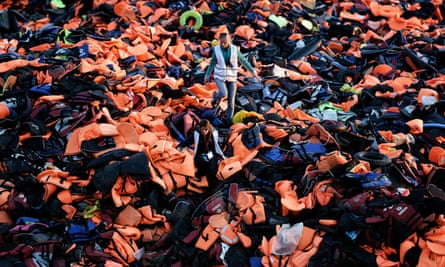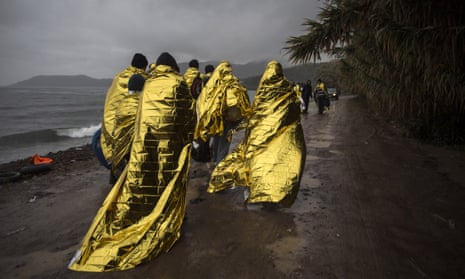Moria refugee camp, on the Greek island of Lesbos, is full of volunteers who have come from all over the world to help displaced people. Burly Dutch men carry huge water tanks, Cypriot doctors erect a new medical tent at the foot of Afghan Hill and major organisations such as Médecins Sans Frontières and Action Aid make their presence felt. But locals are anxious – they’re worried this huge influx of international volunteers is creating more chaos on their small island rather than a coordinated response, resulting in refugees being given bad information and the Greek community’s needs going ignored.
At last count there were 81 NGOs operating on the island, and local media say that just 30 have registered with the local authorities. The island has a population of about 90,000, yet saw almost 450,000 refugees pass through during 2015.
The mayor of Lesbos, Spyros Galinos, says he is heartened by the outpouring of generosity but the presence of NGOs and volunteers doesn’t always have a positive effect. “I am grateful to the ones that immediately responded to our first call for help addressed to the international community to help us cope with refugee crisis,” Galinos has said.
“However, more recently I have seen many NGOs and individuals coming without official registration and showing no cooperation with our municipality. This causes everyone upset and these NGOs arouse doubt and mistrust among the residents of Lesbos. I would say their presence is disruptive rather than useful.”
One local fixer says that it’s “like a party for the NGOs”: some are working closely with the municipality, but many others “have no idea and are just doing their own thing”.
Hotel owner Aphroditi Vati is one resident who has witnessed first-hand the recent spike in volunteers on the ground. Refugee boats have been landing on the beach right outside her hotel in Molyvos, in the north of the island, since April, and she says it was only in mid-September that more people who wanted to help started arriving.
There were often seven boats arriving each day and while the hotel was in desperate need of the assistance, she says the NGOs brought their own problems, too. “We had all these other people speeding onto the property, not respecting where they were, not respecting that they were in a business location, parking their cars wherever they wanted – reporters and photographers, yes, but mainly a lot of volunteers and NGOs,” she says.
Vati says that the newcomers would rush into the water and try to pull refugees off the boats in a way that frightened the already distressed travellers. “You would have all this commotion that was not necessary, and we had people giving out wrong information, saying there were no buses when there were and telling refugees to walk [to the registration point],” she says.
She adds that some organisations provided fantastic help, singling out the International Rescue Committee for specific praise. But Vati also says that one doctor from a smaller NGO shouted: “Who are you and what organisation are you from?” at her after she’d been working night and day for months helping refugees out of the water.
“This is my biggest complaint and concern – when you have so many people coming they don’t take into consideration what the local people have gone through and how this has affected their lives, their mentality, their businesses,” Vati says. “They never came to ask: ‘How can we help you?’ Because it’s not only a crisis for the refugees, it’s a crisis for every local community that the refugee crisis passes through.”

Take into account the fact that the island had just two working ambulances over the summer, and it becomes clear how much help the local authorities needed. One such NGO success story is the Starfish Foundation, an organisation founded by a restaurant owner, Melinda McRostie, who found herself helping refugees brought to shore by the Hellenic Coastguard.
Starfish Foundation employee Emma Eggink says that the organisation was created informally out of necessity, and has become official as the crisis has developed. Eggink says: “We were only funded by asking tourists to leave money in supermarkets. That’s how we were until mid-October, then after that we realised it was impossible to keep doing this forever, especially as October was a crazy month.”
That month, more than 135,000 refugees arrived on the island. “So we’ve registered and we can now receive donations from abroad,” Eggink says. They now have about 80 volunteers and four full-time employees, and have helped set up a transit camp. With a rapidly changing situation, flexibility has very much been on the Starfish Foundation’s side and made them a reliable base for new arrivals on Molyvos harbour.
One independent volunteer, Andy Dewbury, says spontaneity can be the best response in a crisis. “Anarchy is the best way of doing things,” he says. We’re standing on the beach neighbouring Vati’s, and while there was a boat landing an hour and a half before, there are no refugees on the beach. Volunteers present include a group from New Zealand that is staying for two weeks, coastguards from different parts of Greece, and a group of medics trying to plan where they’ll be needed this afternoon.
There’s been an enormous amount of goodwill, says UNHCR spokesperson Boris Cheshirkov, but it is time for people to work together cohesively. “It’s important, because there are so many [volunteers] on the ground that there must be coordination and some kind of management,” Cheshirkov says. “It must be done with the authorities. There is a need and a hunger for coordination especially to avoid duplication and overlap. What’s important from our side is that we encourage everyone on the island, whether they’re an individual volunteer or part of an NGO, that they should register with and inform the authorities of their presence and their activities. This is particularly crucial for those that have special skills.”
Cheshirkov points out that the group that stands to benefit from better organisation are the people this should be about – the refugees. “Better organisation leads to identification of their needs,” he says. “Those of us that have more experience in coordination should have a leading role in coordinating and cooperating with each other. But it’s not competition – nobody’s worth less or more, we all want to help.”
Join our community of development professionals and humanitarians. Follow@GuardianGDP on Twitter.

Comments (…)
Sign in or create your Guardian account to join the discussion